We have much more to do and your continued support is needed now more than ever.
9 Tips for Great Outdoor Photos of Your Kids
Guest post by Ashley Waldvogel Gaddy and Susan McElhinney
No portrait studio can beat Mother Nature! Gorgeous backgrounds, fresh air, and natural light bring spontaneous smiles to your children’s faces. Plus, there’s no appointment fee!
But capturing those fleeting outdoor moments is tricky. Get tips for taking top-notch photos outside with help from two experts: Mom-blogger Ashley Waldvogel Gaddy and Susan McElhinney, the photo editor for Ranger Rick, Your Big Backyard, and Wild Animal Baby magazines.
Photos by Ashley Waldvogel Gaddy
1. Photograph what you love.
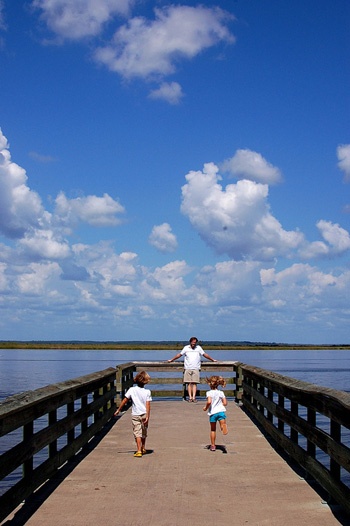
Susan McElhinney: Don’t think you have to have special skills to photograph your children well. There’s a special spirit that emanates from a photograph of children taken by someone who loves them. It really can’t be replicated by a professional photographer. Think of yourself as the documentarian of your children’s lives. Be ready for surprises. Your attention to every detail of each child will shine through in your photographs.
2. Skip the “cheese.”
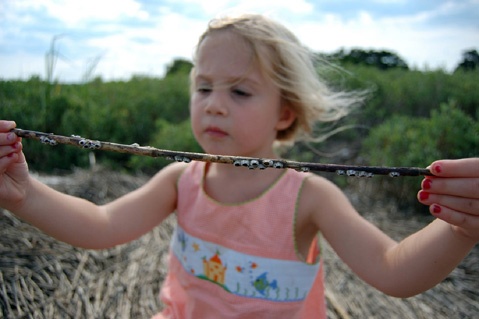
Ashley Waldvogel Gaddy: We all have a tendency to try and pose our children for photographs. But generally we end up with stiff poses and awkward smiles that don’t really capture the moment. Try to back up a little and just watch; let them do their thing and be ready to click when the time is right.
3. Photograph what makes your child special to you.

AWG: For me, that is my daughter’s feet. They are so sweet and small right now, and she loves getting them dirty or sandy. I want to remember those dirty toes forever.
4. Shift the focus.


AWG: Sometimes you can capture a moment by not focusing on your children. I have loads of photos of the treasures my children have found and brought to me. In those cases, I always try to focus on the object, with my child’s sweet face or hands in the background or just slightly visible.
5. Capture relationships.
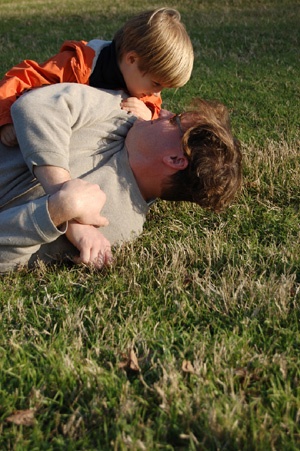
SM: Too often our photos are of the child alone, which doesn’t tell the full story. Look for those moments among siblings, cousins, friends, parents and their children that really illustrate their relationships. Also, being behind the lens gives you a different perspective—and maybe even some insight into your child’s relationships.
6. Establish a sense of place.
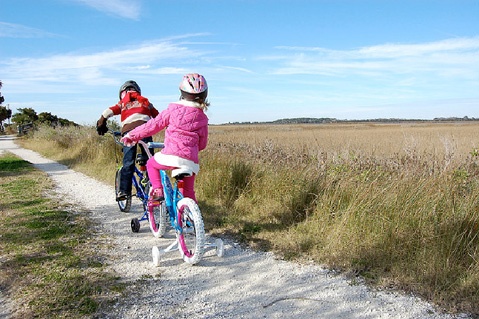
AWG: The landscape of coastal Georgia, where we live, is so important in the story of my kids’ childhood, so I try to include as much of the landscape as possible in my photos.
SM: Yes, it’s important to remember that you are not only creating photographic memories of your children, but of their home, as well. Think of the children when they’ve grown up: They will have a dim, but happy, memory of the backyard or neighborhood park they played in. You can help reawaken memories with photos of their childhood haunts.
7. Get a speedy camera.
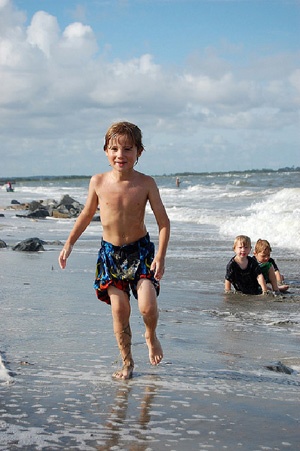
AWG: The biggest complaint I hear from moms is that by the time the shutter clicks, the moment has passed. We all know kids move quickly, so you need a camera that can keep up!
If you have a point-and-shoot camera:
- Put your camera on “sports” mode, which usually has a faster shutter speed.
- Increase the odds of getting the best photo by taking LOTS of photos!
Consider buying a basic DSLR (Digital Single-Lens Reflex) camera. This is what professionals use and it’s more expensive, but it has a faster shutter speed than any point-and-shoot, and it will give you room to grow as you learn about photography.
SM: Point-and-shoot cameras are portable, inexpensive, and easy to use. If you are in the market for one, ask the salesperson to show you cameras that take pictures quickly. Some cameras have a time delay between when you press the button and when the picture is taken, and that can be frustrating.
8. Change your perspective.
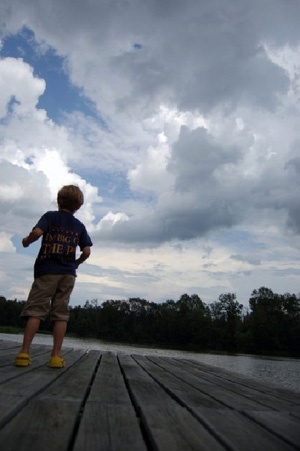
AWG: Don’t be afraid to get down on the ground to capture your child’s perspective on the world! Or do just the opposite and climb higher to capture the action from above.
SM: Many photos are taken looking down on children. Bend your knees and get on their level—it will offer a fresh and revealing view. A “worm’s-eye” view can be fun too!
9. Be creative with light.

AWG: I love it when I am able to capture light in my photographs in a way that really gives a sense of the moment. The general rule of thumb is to always have the sun behind the photographer’s back, but sometimes it’s good to break the rules! Morning and evening light are softer and cast beautiful, long shadows.
SM: The saying is “Put the sun behind your shoulder,” but it should be “Put the sun behind a cloud.” An overcast or rainy day can be perfect picture-taking weather, because it provides a soft, even light.
Do you have photographs or tips to share? Visit the Green Hour Facebook page! Are your kids fledgling photographers? Check out these 11 tips to get your kids outside and photographing the great outdoors.
Susan McElhinney is a photographer of all things that move, Photo Editor of Ranger Rick magazine, Photo Director of National Wildlife Federation’s Children’s Magazines, a mom, and a wanna-be grandmother.
Ashley Waldvogel Gaddy is a mother, artist, college professor, and author of the blog Fletcher & Lola. She is also a supporter of National Wildlife Federation’s efforts to connect kids to nature.





















